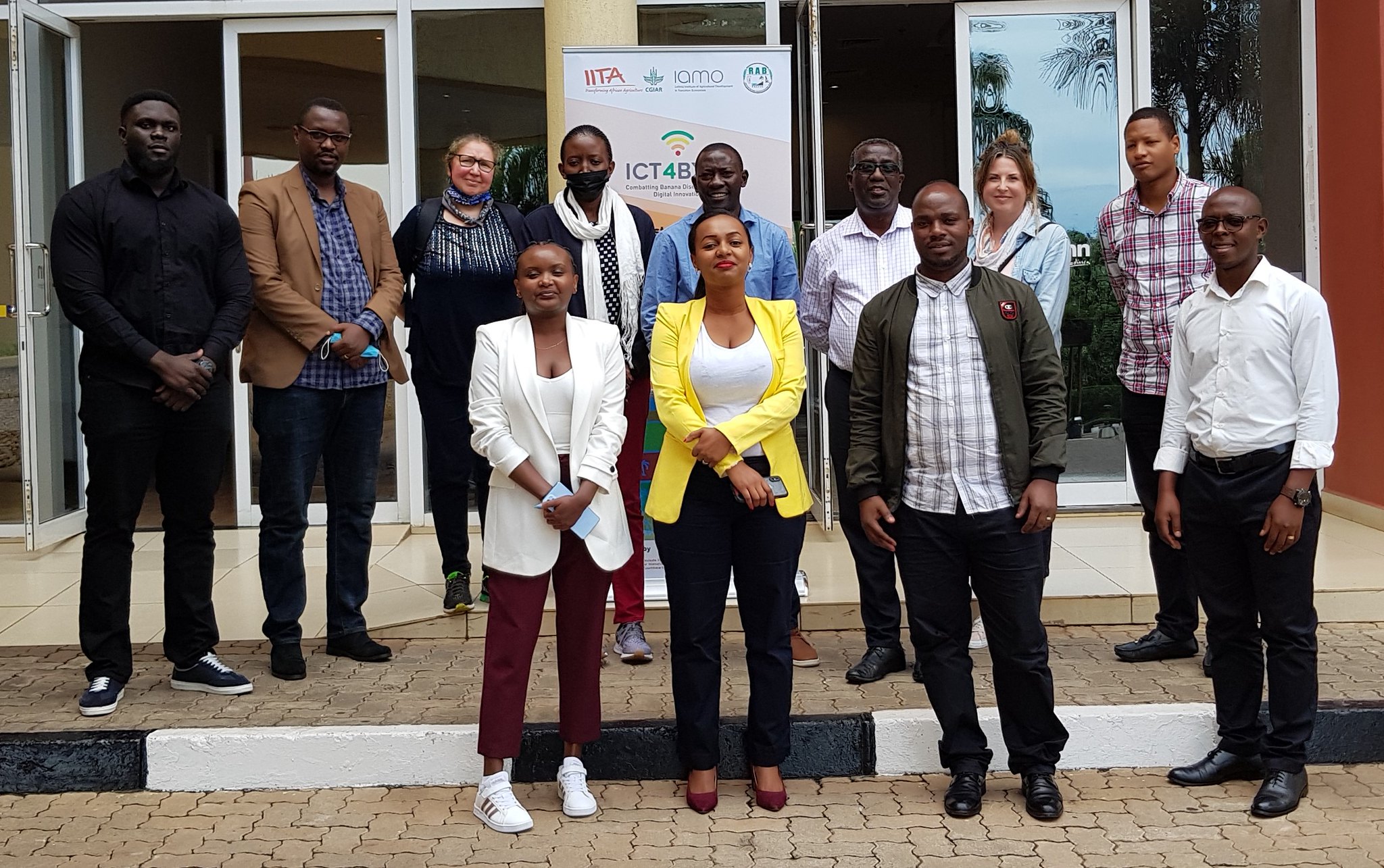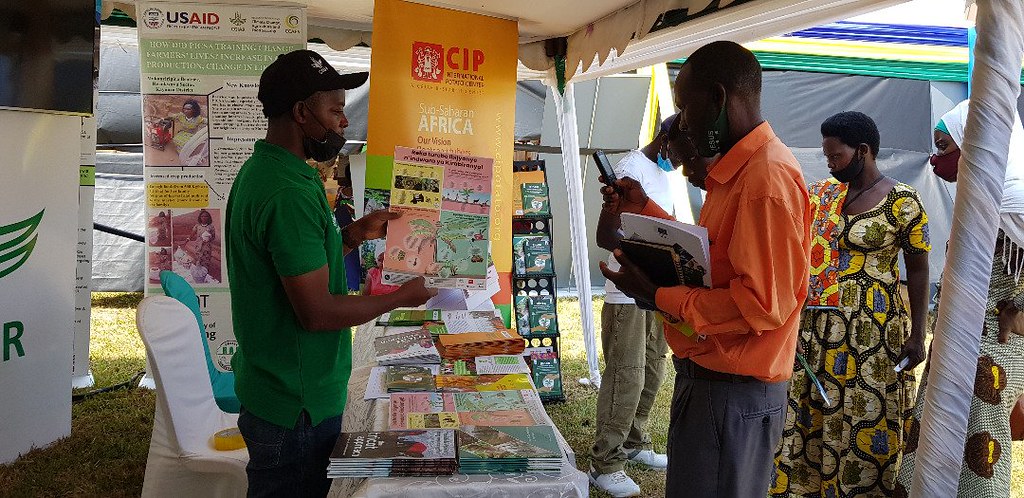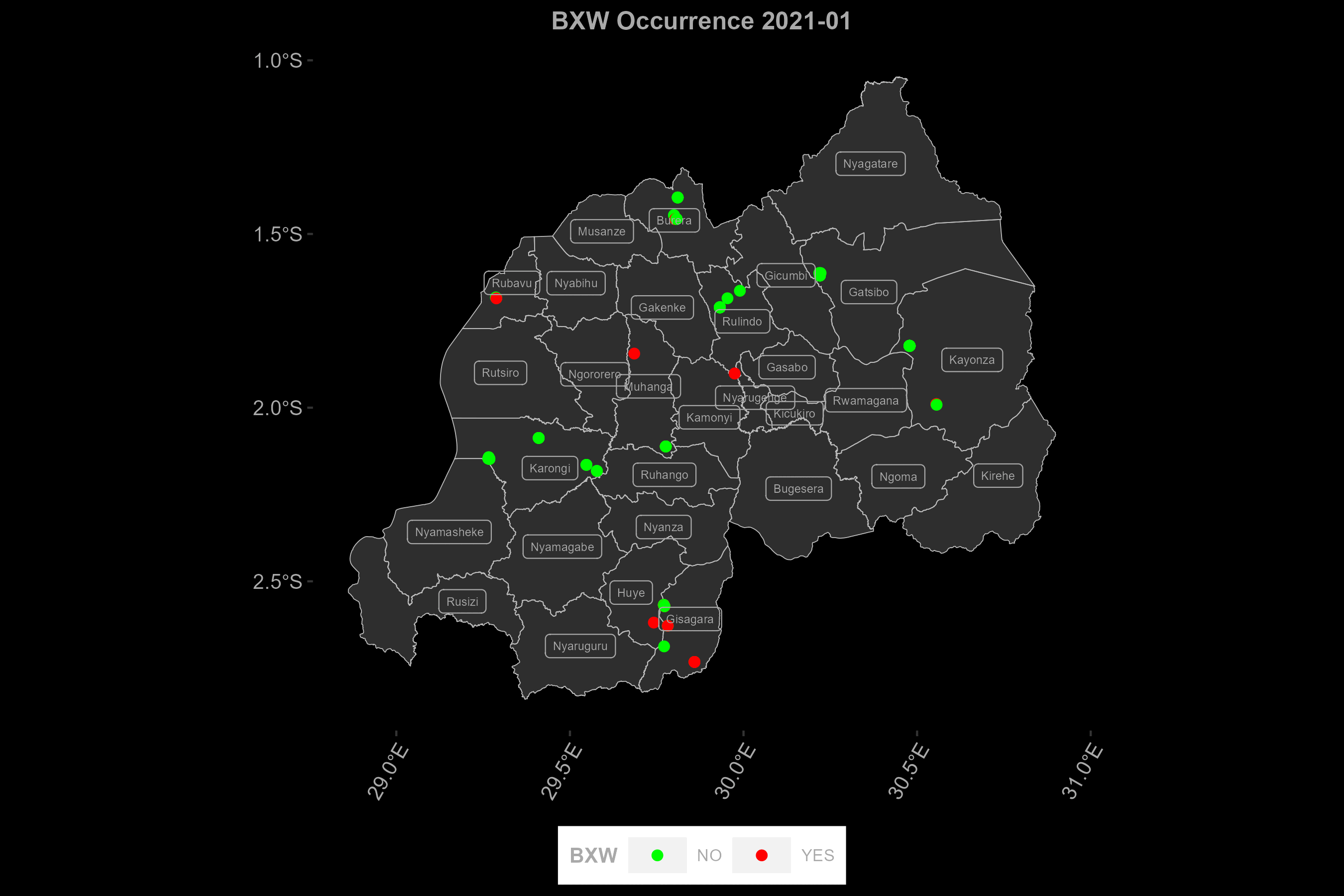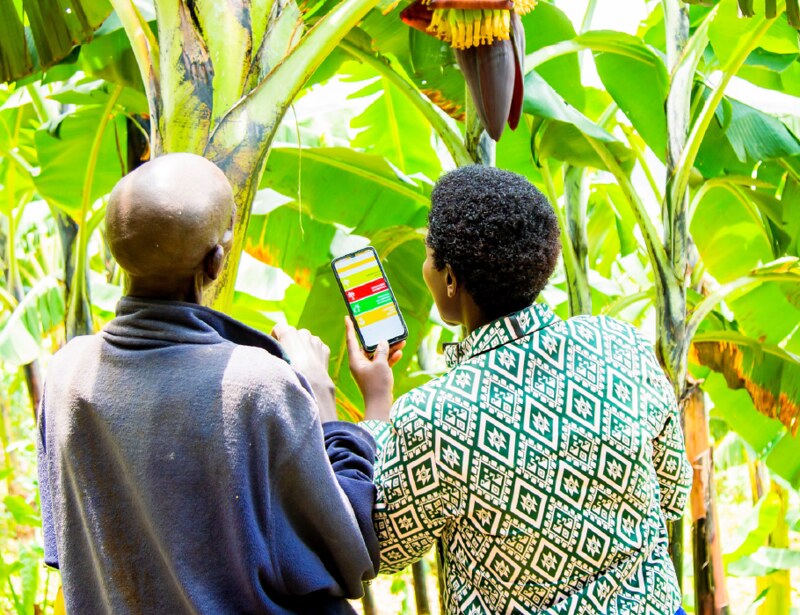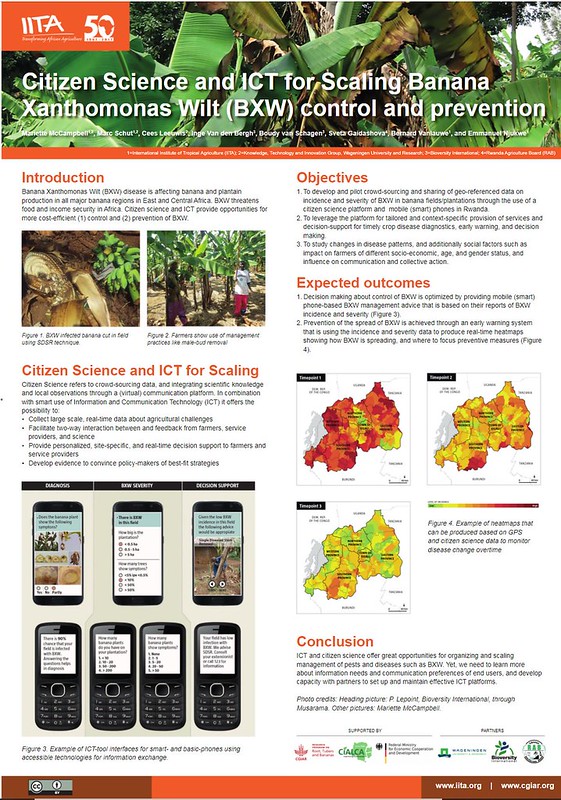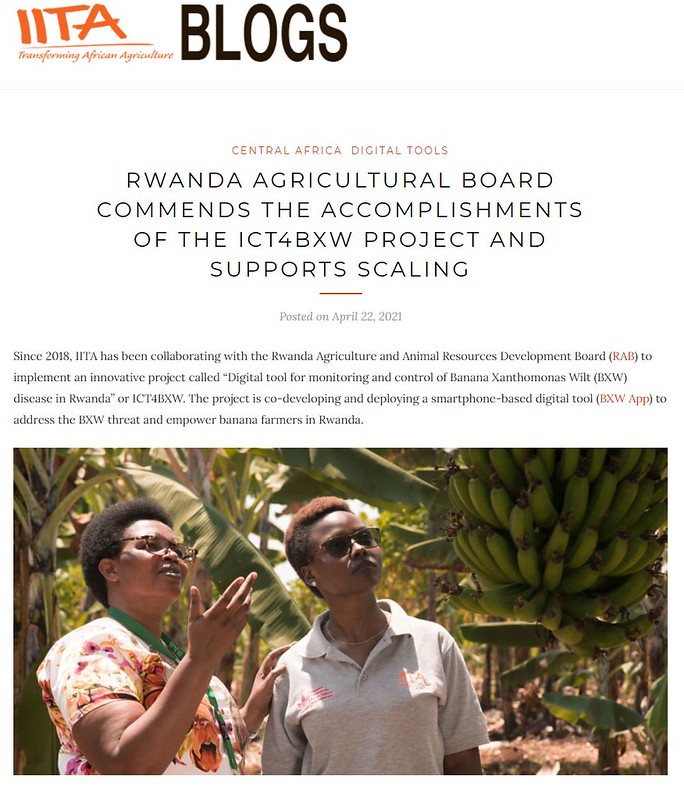Citizen Science and ICT for advancing the prevention and control of Banana Xanthomonas Wilt
In an effort to the help smallholder farmers fight banana disease, the ICT4BXW Project Team developed ICT-based tools for banana agronomy guidelines and early warning system to control Banana Xanthomonas Wilt (BXW).
The broader goal of this project is to leverage citizen science and ICT to prevent and control BXW in East and Central Africa, starting with Rwanda. The digital tools that have been deployed (including BXW Android App, USSD-based Agronomic Extension, and IVR-Based Remote Training) are gradually improving the reality of farmers but providing decision-support for banana management and sustainable production.

Banana: An Indispensable Crop
Banana in Rwanda is a key crop in the livelihoods of smallholder farmers and occupying around a quarter of arable land.
Banana is an important part of peoples’ daily diet and providing income and food security to millions of smallholder households and it plays an important role in the social life of the populations in the African Great Lakes Region.
The Problem
BXW-A Threat to Banana Production
This staple crop (Banana) is threatened by Banana Xanthomonas Wilt (BXW). BXW is a bacterial disease commonly spread from plantation to plantation by insects and infected cutting tools and has spread throughout the region resulting in production losses both at farm and national level. Read more about the disease in the region as discussed by McCampbell et al. here. Tracking the potential outspread of the disease in order to set up prevention policies has been challenging since it appeared in the region.

Lack of Effective Control
Lack of knowledge on sustainable control practices to counter the disease spread is a major problem in the fight against BXW. The project is reinforcing use of sustainable control practices through the use of ICT tools. An effective management approach has been available for a number of years, yet BXW continues to be the scourge of banana farmers across the country.

Lack of Surveillance System
A surveillance system is required for effective control and eventual elimination of the disease for improved livelihoods of the citizens.

Multiplatform Delivery of Digital Tools

BXW App It is an android-based smartphone application that is available and accessible for download in google play store. The App provides well illustrated content (Including pictures, texts, audios and videos) that guides users to prevent and control BXW, identify BXW infected banana plants, and access proven agronomic information for banana farming.

WhatApp-based Chatbot A personalized, interactive WhatsApp chatbot provides Farmer Promoters and Farmers with practical guidance on digitizing BXW disease diagnostic, prevention and management, and equip them with skills for advanced management of their banana plantations. Content can be accessed by sending the word “Kirabiranya”, a Kinyarwanda name for BXW disease, to WhatsApp +250 790 139 375.

8-4-5 service This is a system that provides extension information and banana agronomic advice to farmers through a proprietary 8-4-5 service platform that was developed by project partner (Viamo), hosted by a mobile network provider. The service allows for active and passive access by all farmers, either through smartphone or basic phone.

Remote training The project developed and deployed extension curriculum using the Interactive Voice Response (IVR) technology, and has remotely trained over 1,000 Farmer Promoters on best banana agronomic practices, digital extension delivery, and BXW control, with 98% completion rate achieved over a 4-week period of delivery.
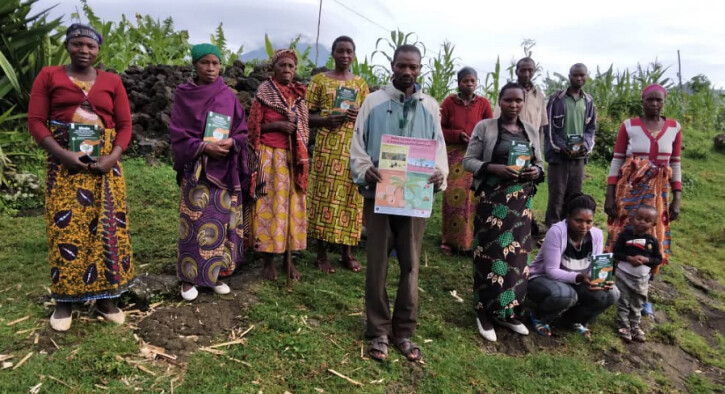
BEYOND DIGITAL: REACHING BANANA FARMERS WITH INNOVATIVE CONTENT
Non-digital decision-support resources (infographic booklets, brochures, farmers’ calendar and Posters) can be easily accessed by both Farmer Promoters and Farmers at their convenience. These showcase banana agronomic advices, symptoms of BXW, and how to prevent or control BXW in farmers’ fields. So far, 2,500 posters and 6,500 booklets have been printed and distributed nationally, in the local language with 98% of users citing their usefulness.

EARLY WARNING ALERTS FOR PROACTIVE BXW CONTROL
The deployment of the BXW App has enabled the delivery of early warning alerts on BXW risk, directly to Farmers’ mobile phones. Based on quarterly pooling of the data, RAB is duly equipped to assess the severity and occurrence of new BXW disease incidence across various districts of Rwanda. The alerts inform farmers about the severity of BXW disease in their area, provide management and control measures, and best agronomic practices to apply in their banana fields to avoid potential losses.
Testimonials
Major Project Insights
Deploying Best-Fit Control Strategy
Previously, BXW has been being managed via different strategies including complete field clearing (CFU), complete mat uproot (CMU),Single Disease Stem Removal (SDSR) and even prevention. Some of these methods are considered to be ineffective and uneconomical, leading to major losses for the farmers. A survey showed how these methods have been applied in the past; CMU (53%), CFU (16%), SDSR (28%) while 3% did not use any of the methods.
A ground level evidence for BXW control through Single Disease Stem Removal (SDSR) trials has been established. Consistent field studies in all districts of study, show decreasing BXW incidence level over the 5 months with the SDSR method compared to the other control plots.
This video provides more information on the project. A policy brief was also developed and adapted by the government of Rwanda. More information on the methodology, analysis and results can be found in Blomme et al. here.
The Gif below shows study sites locations ( Rubavu, Rulindo, Kayonza and Gisagara districts), for providing ground level evidence for BXW control under Rwandan agro-ecological conditions.
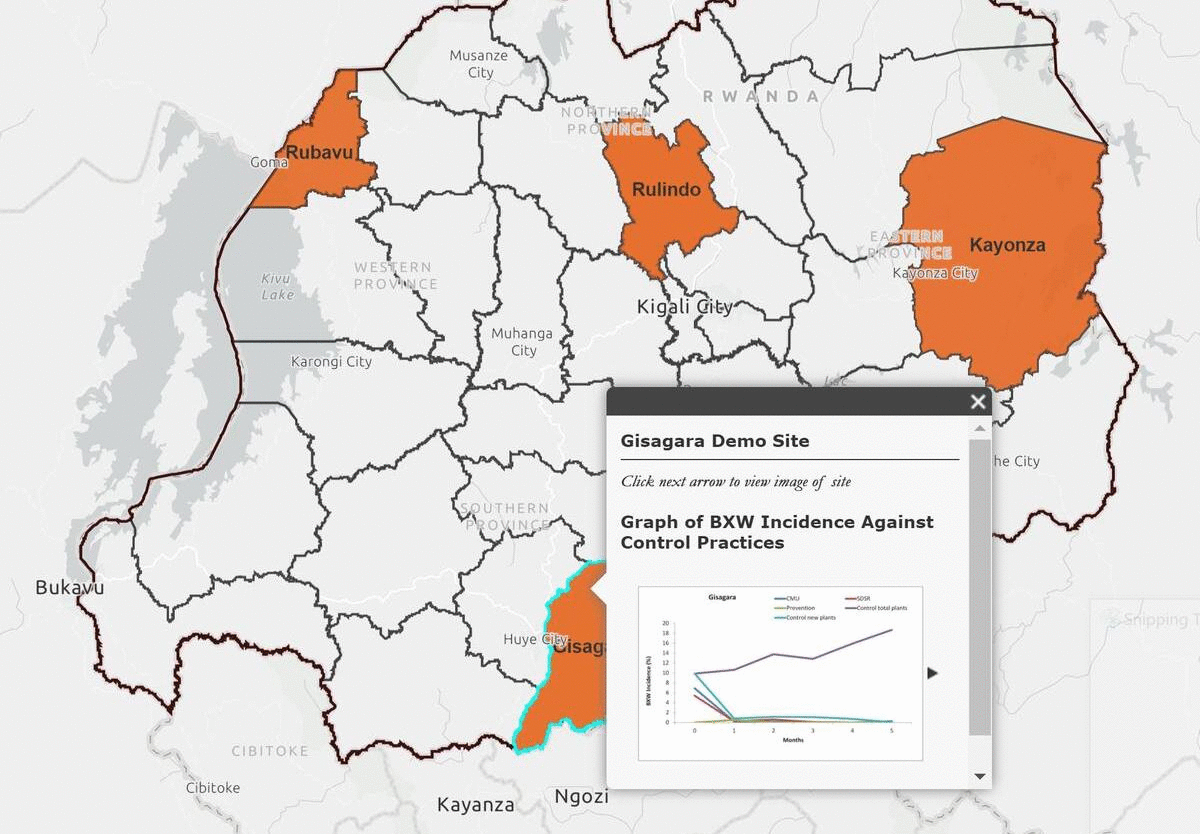
Contact Us
ICT4BXW project is a collaboration between the International Institute of Tropical Agriculture (IITA), Bioversity International, the Rwanda Agricultural and Animal Resources Development Board (RAB) and the Leibniz Institute of Agricultural Development in Transition Economies (IAMO).
This work received financial support from the German Federal Ministry for Economic Cooperation and Development (BMZ), commissioned and administered through the Deutsche Gesellschaft für Internationale Zusammenarbeit (GIZ) Fund for International Agricultural Research (FIA).
Associated Scientific Publications
Highlights
Led by Funded by


Location:
RAB (Banana Program) KK 18 Ave, Kigali, Rwanda
IITA Office KG 563 ST #7 Kigali, Rwanda
Email:
iita.rab.bxw@gmail.com
Call:
+2507







